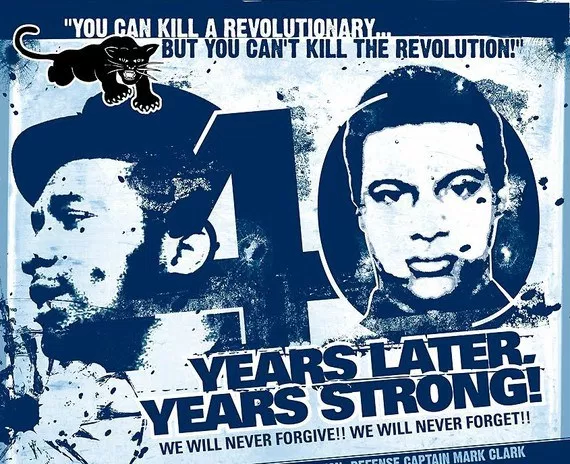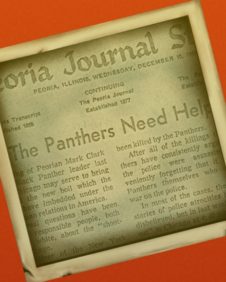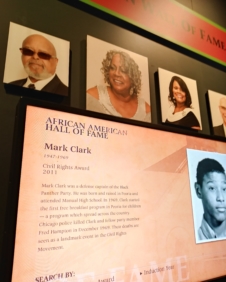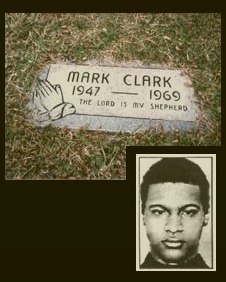The city’s real Black Panther gets shafted, again, by the Peoria Journal Star
(March 24, 2018, Peoria, IL.) — After all the years, and all the change, and all the opportunities to do simple fair reporting and analysis, you have to wonder what exactly is behind the inability of the Peoria Journal Star to do right by Mark Clark.
This daily newspaper of record in central Illinois cannot even commit to basic journalism in 2018 when it comes to the city’s late revolutionary human rights’ leader who was murdered by Chicago police under the direction of FBI COINTELPRO authorities during the extra-judicial execution of the legendary Illinois Black Panther Party Deputy Chairman Fred Hampton in an infamous predawn home raid on December 4, 1969.
Just days ago on March 10, the Journal Star published long-time columnist Phil Luciano’s work “Killing of Peorian Mark Clark at center of Black Panther exhibit”. In the very first mention of Clark, Luciano writes, ” . . . plus a guest room used by Mark Clark, a party member from Peoria.”
Clark was not just “a party member from Peoria,” he was the founder and unquestioned head of the Peoria chapter of the Illinois Black Panther Party.
Repeatedly describing Clark as “a party member” is like calling Barack Obama a Democratic Party member in 2009 without referring to the fact that he was the president of the US, and the undisputed leader of the party. Almost 50 years afterwards, Luciano and the Journal Star newspaper won’t state the fact, and thereby give him his proper place and position in history, that Mark Clark was the founder and head of the Peoria chapter of the Illinois Black Panther Party at the time of his death. If they cannot get that right, how can this writer Luciano and especially this city newspaper be recognized for serious and responsible journalism?
The best Luciano can say about Clark is he “ventured to Chicago . . . to attend organizing and strategy sessions of party leaders from throughout the state.” Sorry, but that doesn’t remotely identify Clark as head of the Peoria chapter. And the many photo captions that accompany Luciano’s column all refer to Clark only as “Peoria (BPP) member”.
Why won’t the writer and the newspaper give Clark his due?
All Luciano had to do is read my very recent December 2017 front-page article in Peoria’s Community Word monthly newspaper to see what BPP position Clark held. It’s right in the first paragraph. Or he could have referred to the academic work “Nobody Knows My Name: The Marginalization of Mark Clark in America’s Collective Consciousness,” in International Social Science Review (2010, Vol. 85, Nos. 3 & 4) by Dr. Judson L. Jeffries and Dr. Omari L. Dyson.
The article noted, “Clark is important because of the work that he did. He opened up a Black Panther Party branch in a city where there was not a tremendous amount of radical activity, which means he could not hide from authorities. He was right out front and there were few other radical groups whose members experienced the repression levied by the police.”
As the head of the Peoria Black Panthers, Clark started the first free breakfast program for children on the city’s South Side. “He came to my church (in 1969) and asked me, ‘Rev. Ramsey, can we use Ward Chapel A.M.E. for our breakfast program?’ And I consented to it — no other church in Peoria would open their doors — for what I considered a worthwhile endeavor. There were a number of little children who really needed a good breakfast,” Rev. Blaine Ramsey, head of the renowned Ward Chapel church from 1966-1969, said in a past interview. The minister noted the Peoria Black Panthers’ breakfast program for children headed by Clark served approximately 30 students Monday through Friday for six months.
If Luciano and the Journal Star can make sure their readers know that Clark was arrested for selling BPP newspapers without permission on the Bradley University campus, and that Clark had been previously arrested for non-Panther related “fisticuffs,” why is there no mention of the Peoria Black Panther head’s months-long free children’s breakfast that served thousands of meals?
Other local people sure noticed.
Since 2011, people like the African American Hall Of Fame Museum in Peoria noticed Mark Clark. That’s the year he was inducted into this august group that includes John Gwynn, Evelyn Ogletree, Richard Pryor, Wayne McCain, Jimmy Binkley, Warletta Johnson, and many more.
So why there is no mention of Clark’s HOF status in this piece recounting his life and legacy?
And Luciano could have better informed himself about Clark’s life if he had simply visited the Peoria Riverfront Museum, where Clark’s place in the African American HOF has been a presence since 2012. His photo and short bio are right there in the African American Wall of Fame display within the museum’s Peoria History Center. Not so hard to find, really.
To recap, in a March 2018 piece about Mark Clark’s place in a Chicago Black Panther storefront history exhibit, Phil Luciano and the Peoria Journal Star neglect to state 1). Clark was the founder & head of the Peoria chapter of the Black Panther Party; 2). Clark began and maintained a free children’s breakfast program in the Peoria’s most important African-American church, but make sure we know about his minor arrests for selling newspapers and “fisticuffs”; 3). Clark was inducted into the Peoria African-American Hall of Fame seven years ago; and 4). Clark’s inclusion in the permanent Peoria History Center African American Wall of Fame exhibit within the Peoria Riverfront Museum six years ago.
Hey, I understand that Luciano is a columnist and not technically a reporter, but he is still bound by journalistic ethics of fairness and balance and context. When I contacted Luciano five years ago about a story on Clark, he begged off claiming I was attempting to bully and shame him into writing something about Clark when I offered “Your paper especially has a lot to make up for in recognizing the good and significant work of Peorian Mark Clark.”
He should have never taken on the topic. Luciano’s column only adds to the litany of misrepresentations, omissions, malfeasance and outright racism exhibited by the Peoria Journal Star in connection with Mark Clark ever since his murder nearly 50 years ago.
In its December 10, 1969 issue, less than a week after Clark’s murder, the lead editorial titled The Panthers Need Help claimed, “And it was finally put together under the Panther label by a coterie of articulate ex-convicts and jobless civil rights activists who duped a few young men who were not overly bright to sell their newspapers and play the cannon-fodder roles of tough-guy revolutionaries.”
Not overly bright jobless ex-convicts. Hmmm. I’m surprised the Journal Star found enough restraint to actually not use the n-word.
A week after its first Panther editorial, the Journal Star published a follow-up piece Slowness in Washington that decried the US Attorney General’s apparent foot dragging in ordering the FBI to investigate Clark and Hampton’s killings. The reason for that delay? Again, the Journal Star blamed the victim: “The slowness of Attorney General (John) Mitchell’s response and the complete silence from the White House in regard to the Chicago affair is a discouraging commentary on how far the extremist tactics of the Black Panthers and other violent groups have set back black people in their quest for justice.”
That editorial confidently concluded, “We know justice will be done in Chicago . . . but it may be a little longer in the doing.” In fact, like Luciano noted, no one was ever convicted in the deaths, and it took until 1983, 14 years after the murders, that a $1.85M settlement was finally awarded to the raid survivors, families of Hampton and Clark, and their lawyers.
The Journal Star did wrong by Mark Clark in its editorial pages when he died, and it continues to do wrong by him even now decades later in the woefully incomplete words of one of its main columnists.
In their article, professors Judson and Dyson note that, “Clark’s lack of national distinction should not detract from viewing him as an important figure in American history. He is important because he sacrificed his life so that others may live a better life. He is important just as hundreds of civil rights workers whose names were not household words were important, but whose work made a difference in people’s lives.”
Luciano and his newspaper need to apologize to Clark, his family, and the entire African-American community. Until they do, the columnist and the city’s daily newspaper cannot call themselves fair and responsible members of the local media.
See my earlier works on Mark Clark included below for more details and background on his life and legacy.[]
—————————————————————————————————————————
Elner Clark, sister of slain Peoria Black Panther leader Mark Clark, recalls the times on 48th anniversary of his killing by Chicago authorities
(Appeared under different title on front page of December 2017 issue of Community Word, Peoria, IL.)
Editor’s Note: Peorian Mark Clark was 22 and a member of the Peoria NAACP and leader of the Peoria Chapter of the Illinois Black Panther Party. He was running a BPP free breakfast program for children in Peoria. In December 1969, he went to Chicago to meet and train with Fred Hampton, head of the Illinois Black Panther Party. Both men were shot and killed in a police raid on Hampton’s apartment.
“My brother (Mark Clark) said to me, the last words he spoke to me on Thanksgiving Day (1969), less than a week before his death, as he was leaving, going to Chicago. He said to me, ‘I’m doing this because of them.’ And he spoke of my nephew and my daughter (they were preschoolers), ‘I’m doing this for them,’” Elner Clark, 68, of Peoria said at her home on Nov. 17.
“He knew that, he had the political consciousness to know that we as a people, a black people, had been under repression too long. And there needed to be a change. And that is what he was about. Making a change for the next generation. And he did that with the (free children’s) breakfast program (at Ward Chapel AME Church). He wanted to make a contribution. That is what people need to know. He said he did it for the next generation.”
Dec. 4 marks the anniversary of the infamous predawn raid and police killings of Clark and Illinois Black Panther Party leader Fred Hampton in Chicago. Clark was the leader of the Peoria chapter of the BPP and had traveled to the Chicago headquarters for additional training, and more.
Clark was “not going to leave Fred”
“Mark had spoken with my brother James the day before the killings. And in his communication with James he said that he knew that there was an assassination attempt on Fred Hampton, and he was not going to leave Fred,” Elner Clark said. “He took on the responsibility of being defense captain.”
Mark Clark was only 22 when he was shot down by Chicago police in a pre-dawn raid on a Panther apartment targeting Illinois BPP leader Fred Hampton, who was only 21. Hampton and his colleagues were betrayed by a fellow Panther who provided the police with a layout of the apartment, and who managed to drug Hampton that night. Hampton was shot point blank in the head as he lay on his mattress. Clark was killed in a chair holding a shotgun apparently on security detail and may have fired a shot. The flat was riddled by nearly a hundred police bullets and several other Panthers were shot and wounded.
The one-sided carnage was so obvious that an observer described the scene as “nothing but a Northern lynching.” Internationally renowned U.S. intellectual and scholar Noam Chomsky has reportedly called the killing “the gravest domestic crime of the Nixon administration.” No one was ever convicted in the case that became one of the longest and costliest civil lawsuits in federal court history. A $1.85 million settlement in the early 1980s was split between the raid survivors, families of Hampton and Clark and their lawyers.
The police, in conjunction with the Cook County State’s Attorney office, and federal authorities carrying out its then-secret COINTELPRO operations at the direction of the FBI’s J. Edgar Hoover, were also attempting to assassinate Bobby Rush, the Illinois BPP defense minister and Hampton’s second in command. Luckily he was elsewhere, and went on serve the people of Chicago and more. Rush is the current U.S. Congressman from Illinois’ 1st District, and the only person to ever defeat Barack Obama in a political campaign.
A federal grand jury determined that the police fired between 82 and 99 shots at the people in the flat. Only one shot was proven to have come from a Panther gun. Four other Panthers were wounded.
“It was very horrific that Mark could be killed like that,” Elner Clark recounted when she and her family heard the news of her brother’s death at the hands of police.
No authorities ever contacted the Clark family about the death.
“We waited and we waited and the announcement that came over the news media, on the television and the radio, was when they finally released the information that Mark was deceased. We were never contacted with this information. We heard it over the media. They said he was in Cook County morgue, unclaimed. They said his body had not been claimed. We were appalled. There was no communication. They knew who he was. They knew who he was,” Elner Clark spoke in a voice of deeply heartfelt emotion 48 years afterwards about the systemic injustice that followed her brother even after death.
“There was no obituary, but the whole city came out, the black community, at Freedom Hall,” she said. “There were probably a thousand people, if not more. Huge. They filed in (to view Clark’s body lying in state wearing BPP jacket and beret) and came out. Rev. Blaine Ramsey (of Ward Chapel AME) gave the eulogy.”
Peoria Journal Star: Panthers were ex-convicts, jobless & not overly bright
The inaccuracies and worse about Clark at the time of his death included prominent editorials by the Peoria Journal Star. “Hate coupled with intimidation and demagoguery made the Panthers into a sort of a black Ku Klux Klan,” wrote the Journal Star on Dec. 10, just days after Clark’s death. “The white sheet was replaced with the black beret and jacket.”
Apparently self defense and demagoguery somehow became the equals of murder, lynching, bombing and torture of innocent men, women and children of color. Who knew?
False comparisons aside, this same central Illinois daily also publicly declared: “And it was finally put together under the Panther label by a coterie of articulate ex-convicts and jobless civil rights activists who duped a few young men who were not overly bright to sell their newspapers and play the cannon-fodder roles of tough-guy revolutionaries.”
The Journal Star made it crystal clear to its overwhelmingly white readership that Mark Clark and his Black Panther Party African-American colleagues were nothing but their worst imaginings of the black males among them. The Dec. 10, 1969 editorial thankfully stopped short of using the n-word, but the labels of ignorant jobless ex-cons for a group of black men (nothing is mentioned about the BPP women) engaged in revolutionary political and civil tactics pretty much tells the reader then and now all they need to know about the racism and paternalistic attitude of Peoria’s paper of record. The editorial was shockingly titled “The Panthers Need Help.”
Requests for comment about the Journal Star’s past editorials were made to Managing Editor Sally McKee. No one from the paper responded by publication time.[]
———————————————————————————————————————
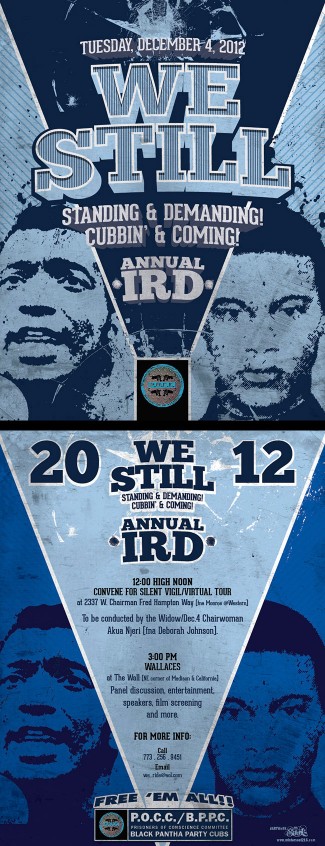
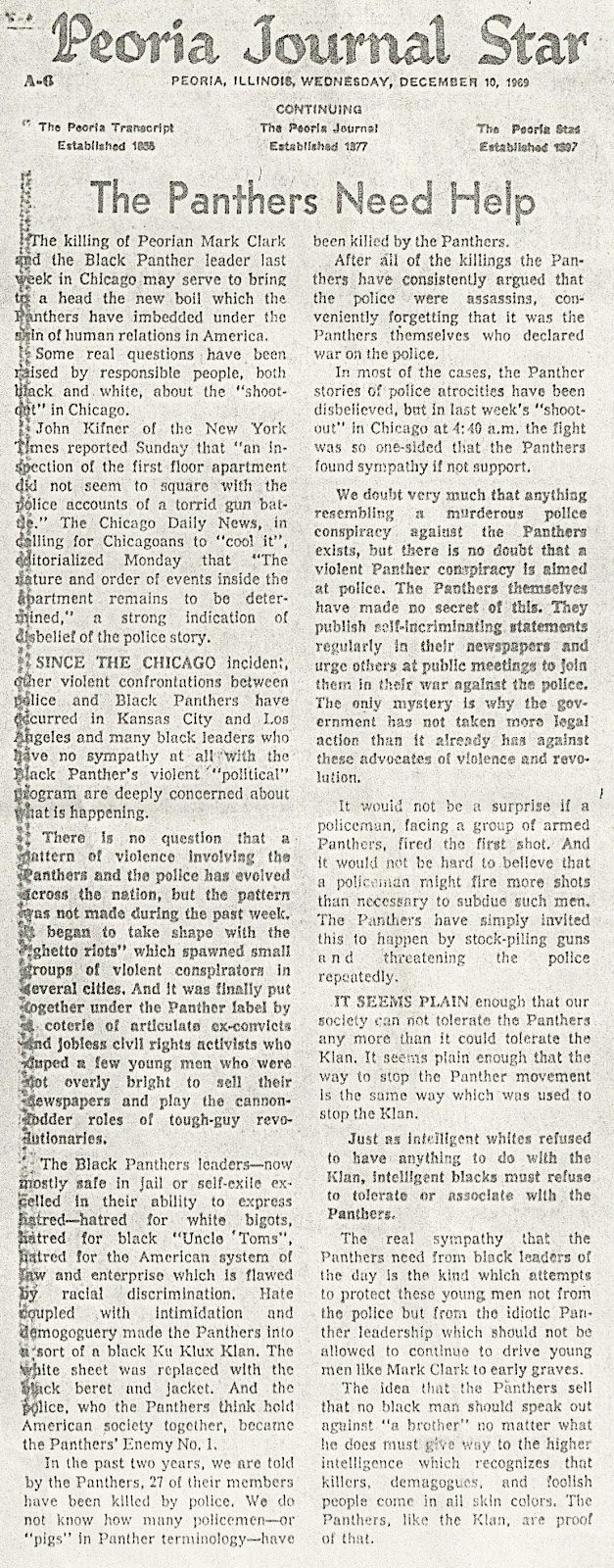
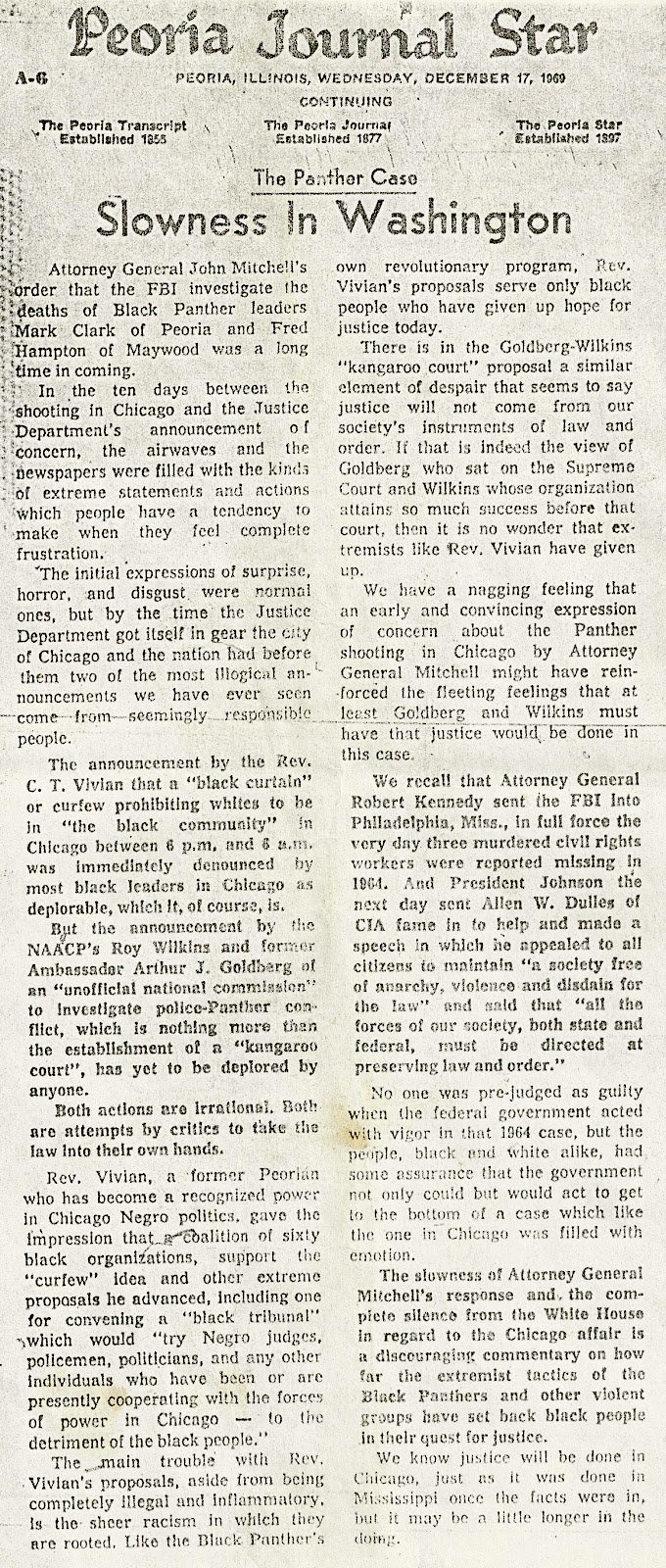
(appeared originally on 5/27/16 in The Huffington Post
(appeared originally on 1/26/13 in EmergePeoria.com
